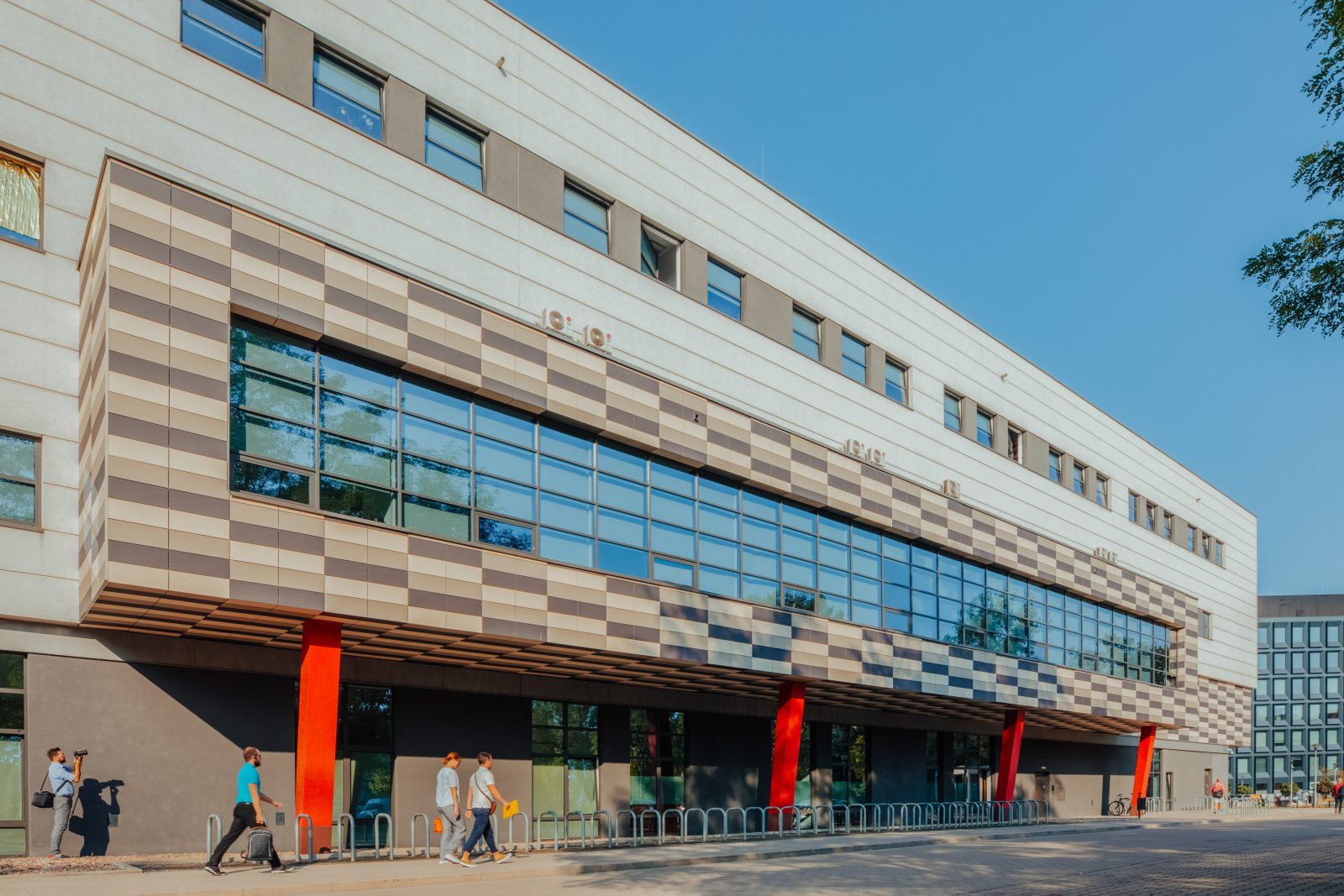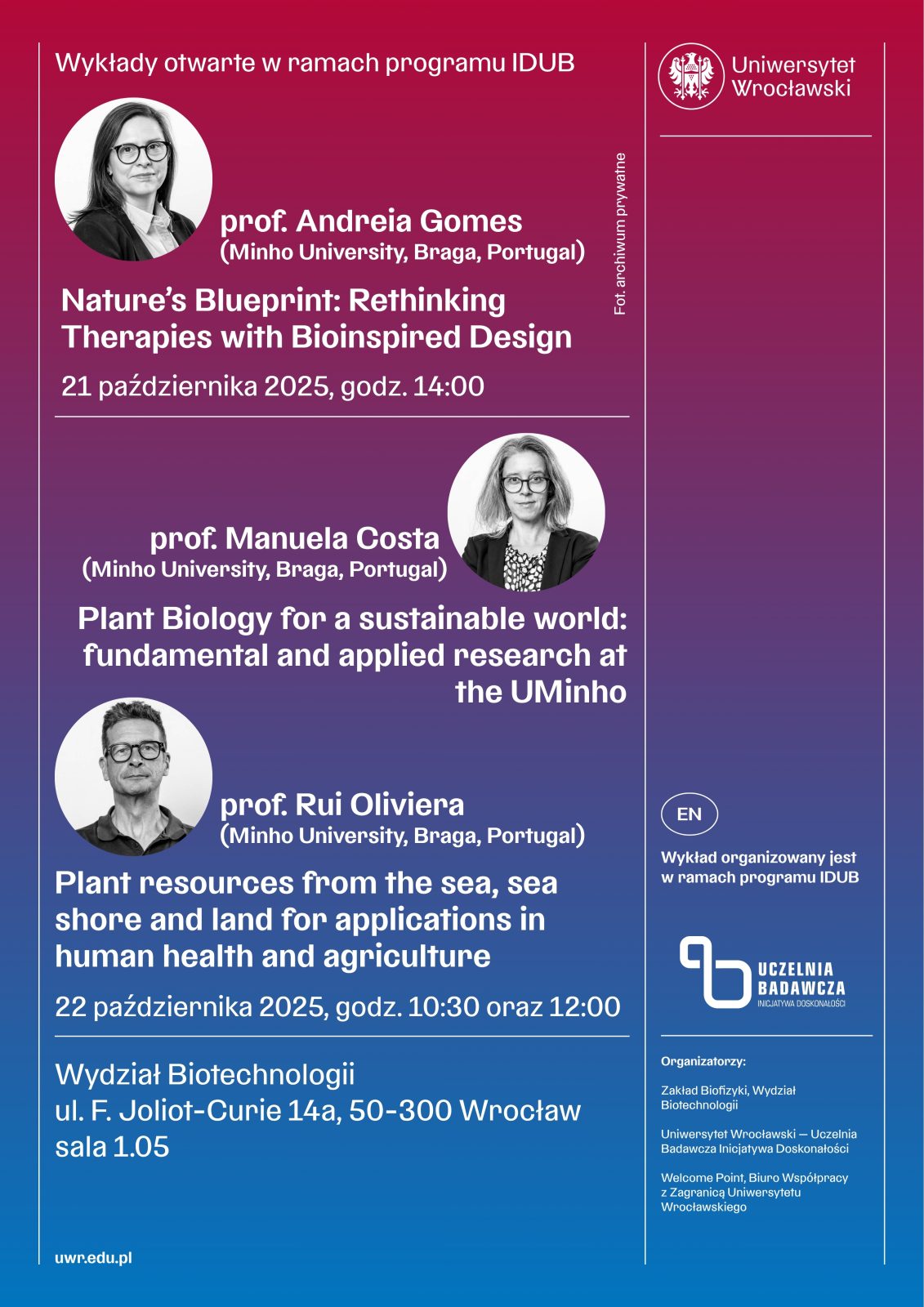
Naukowcy z Portugalii gośćmi Wydziału Biotechnologii UWr
Wydział Biotechnologii Uniwersytetu Wrocławskiego zaprasza na serię wykładów naukowych w ramach programu Visiting Professors. W dniach 21–22 października 2025 r. gościć będziemy wybitnych naukowców z Centre of Molecular and Environmental Biology, Minho University, Braga, Portugalia.
Wydarzenie rozpocznie się we wtorek 21 października o godz. 14:00 wykładem prof. Andreii Gomes, zatytułowanym „Nature’s Blueprint: Rethinking Therapies with Bioinspired Design”.
W środę 22 października odbędą się dwa kolejne wykłady: o godz. 10:30 prof. Manuela Costa przedstawi wykład „Plant Biology for a sustainable world: fundamental and applied research at the UMinho”, a o godz. 12:00 prof. Rui Oliveira zaprezentuje temat „Plant resources from the sea, sea shore and land for applications in human health and agriculture”.
Wszystkie wykłady odbędą się w sali 1.03 Wydziału Biotechnologii przy ul. F. Joliot-Curie 14a.
Poniżej prezentujemy biogramy i streszczenie wykładów.
- 21 października o godz. 14:00 wykład pt. „Nature’s Blueprint: Rethinking Therapies with Bioinspired Design” wygłosi prof. Andreia Gomes
Prof. Andreia Gomez (orcid 0000-0001-9032-5690, HI 31, 146 publikacji, ponad 3000 cytowań) jest biologiem z tytułem doktora neurologii (2004) z Karolinska Institutet w Szwecji. Obecnie jest profesorem nadzwyczajnym na Wydziale Biologii Uniwersytetu Minho w Portugalii i wicedyrektorem Centrum Biologii Molekularnej i Środowiskowej (CBMA, https://cbma.uminho.pt, od 2022). Jej obecne zainteresowania badawcze skupiają się na rozwoju bioinspirowanych systemów dostarczania leków, a w szczególności wstępnej selekcji związków bioaktywnych ekstrahowanych z roślin i innych organizmów (algi, gąbki morskie) projektowanie nanourządzeń z wykorzystaniem elementów biologicznych lub pozyskiwanych na drodze zielonej syntezy. Prof. Gomez w szczególności skupia się na badaniu oddziaływania między nanostrukturami a komórkami i tkankami (tzw. interfejs bio-nano) w celu optymalizacji efektu terapeutycznego.
Projekty kierowane przez Andreę Gomes obejmują rozwój technologii/prototypów w skali laboratoryjnej i następnie współpracę z przemysłem (m.in. projekt FP7 Nanofol, projekt ATLANTIDA). Jest współzałożycielem spinn-off na opracowanie technologii kontrolowanego dostarczania kwasów nukleinowych. W jej portfolio znajdują się patenty związane z przyjaznymi środowisku opakowaniami.
O wykładzie
Living systems have evolved highly efficient mechanisms for molecular transport, communication, and repair — offering invaluable blueprints for the design of next-generation therapeutic platforms. Our current research focuses on the development of bioinspired drug delivery systems aimed at promoting human well-being. We engineer multifunctional bionanodevices built from natural or biomimetic components, and formulations mimicking natural mechanisms, providing targeted and sustainable strategies for therapeutic delivery. This talk will focus on a new nanocarrier inspired in naturally occurring exosomes for delivery of nucleic acids and bioactive components. Its main features will be presented as well as the development of neuroprotective tools with potential for management of neurodegenerative disorders, such as Alzheimer’s disease.
In this talk, I will also present an overview of the research carried out by Translating Life – CBMA, at the University of Minho. Guided by the motto “Bio-resources and Bio-Inspired Systems towards Bio-Sustainability,” the group is committed to developing sustainable, biobased solutions for biotechnological and environmental challenges. Relying on CBMA’s biobanks and the CDB Microbial Research Resource Infrastructure (MIRRI-ERIC), Translating Life focuses on: (i) exploiting bioresources for greener solutions; (ii) promoting a circular bioeconomy through cell factories and precision fermentation; and (iii) improving environmental monitoring and remediation using bioinspired materials and devices.
- 22 października o godz. 10:30 wykład pt. „Plant Biology for a sustainable world: fundamental and applied research at the UMinho” wygłosi prof. Manuela Costa
Prof. Manuela Costa obroniła doktorat w zakresie genetyki molekularnej w John Innes Centres w Norfolk w Wielkiej Brytanii i odbyła staż podoktorski na Uniwersytecie w Edynburgu. Obecnie zatrudniona jest na Uniwersytecie Minho w Portugalii jako profesor biologii.
Badania prof. Manueli Costy (ORCID 0000-0001-9032-5690, HI 19, 34 publikacje, ponad 1900 cytowań) wpisują się w szeroko rozumiany zrównoważony rozwój oraz bierze udział w projektowaniu systemów agronomicznych umożliwiających maksymalne zachowanie bioróżnorodności. W szczególności skupia się na zrozumieniu odpowiedzi roślin na czynniki środowiskowe, w tym na badaniu zmian epigenetycznych, mechanizmów regulacji kwitnienia oraz szlaków sygnałowych w obrębie komórki roślinnej. Dodatkowo, bada także podłoże genetyczne zróżnicowania odporności roślin.
O wykładzie
The development of floral structures is a pivotal step in the reproductive cycle of flowering plants and is controlled by endogenous and environmental cues fine-tuned by highly complex gene regulatory networks (GRNs). In our lab, we have been studying new MYB sub-family of transcriptional regulators called DIV-and-RAD-interacting-factors (DRIFs) first described in Antirrhinum majus, where they are involved in the antagonistic DDR module that regulates the establishment of flower asymmetry. InArabidopsis, AtDRIF mutant plants exhibited delayed flowering, and defects of growth under dark. Transcriptomic studies either in Antirrhinum majus,Arabidopsis, and Marchantia polymorpha have unveiled potential players into the physiological processes controlled by the DRIF genes.
The knowledge of GRNs that control plant development, mostly obtained using model plants, has opened up the possibility of understanding likewise development programs in crops, which can be vital to improve important agronomic traits. In several Mediterranean countries, species from the Fagaceae family (e.g. Quercus suber, Castanea sativa) constitute the basis of an important agroforestry system. In our lab we are also studyingmolecular mechanisms that lead to a successful fructification in these trees, such as dormancy induction and break, flowering induction and development of unisexual male catkins and bisexual catkins.
In this talk I will also give an overview, of the work we do in the group GROWING LIFE – CBMA at the University of Minho. In GROWING LIFE we are committed to explore agroecosystems resilience and disease control by exploring natural solutions, such as the use of biocontrol agents and non-chemical methods (https://cbma.uminho.pt/growing-life/).
- 22 października o godz. 12:00 wykład pt. „Plant Biology for a sustainable world: fundamental and applied research at the UMinho” wygłosi prof. Rui Oliveira
Dr Rui Oliveria (Orcid 0000-0002-3989-8925, HI 17, 69 publikacji, ponad 1000 cytowań) jest specjalistą w zakresie oddziaływania patogenów i roślin, a także wykorzystania materiałów i substancji pochodzenia roślinnego (metabolitów drugorzędowych) dla celów medycznych i przemysłowych (produkcja kosmetyków i biotekstyliów). Do jego osiągnięć należą m.in. badania aktywności przeciwdrobnoustrojowej ekstraktów roślinnych, włącznie z wyjaśnieniem mechanizmu ich działania, np. poprzez określenie znaczenia składników ściany komórkowej w protekcji, genotoksyczności czy indukcji mechanizmów śmierci komórki. Był zaangażowany w wiele projektów krajowych i międzynarodowych, m.in. projekt strategiczny Fundao para a Cincia e a Tecnologia dotyczący biologii środowiskowej. Obecnie zaangażowany jest m.in. w projekt Ethnoherbs, finansowany przez agencję Unii Europejskiej. Celem Ethnoherbs jest przeprowadzenie szczegółowych badań etnobotanicznych połączonych z wykorzystaniem najnowszych technologii pozyskiwania produktów naturalnych, w poszukiwaniu potencjalnych substancji dla zastosowań terapeutycznych.
O wykładzie
Being sessile organisms, plants have evolved sophisticated responses to cope with environmental stress. Their highly developed secondary metabolism accounts for the remarkable diversity of metabolites with relevant biological functions. Antioxidant activity, which protects genomes from oxidative damage, and antimicrobial activity, arising from adaptation to biotic stress, are among the most common features of these metabolites. It is therefore likely that plants thriving in extreme environments have evolved metabolic pathways that provide effective stress protection.
Halophytes, which grow in seashore habitats, are particularly resilient to salinity and intense solar radiation. Similarly, algae are constantly exposed to high levels of sunlight. In this talk, I will present halophytes, macroalgae, and microalgae as representative sources of secondary metabolites with biological relevance. Halophytes are especially rich in polyphenols such as (+)-catechin, (−)-epicatechin, their oligomers, and myricetin derivatives, which have been associated with antigenotoxic effects. In contrast, algae predominantly synthesize pigments, lipids, and polysaccharides. The antioxidant and antigenotoxic properties of edible halophytes and microalgae extracts will be discussed, emphasizing their potential applications in functional foods designed to counteract environmental and dietary toxicants. For macroalgae, I will highlight their potential neuroprotective activity, underscoring the promise of marine organisms as a source of new pharmaceuticals. In addition, the antimicrobial activity of selected plant extracts will be shown as an alternative to synthetic fungicides in agriculture.
Overall, the presentation will outline the potential of stress-resistant plants and algae as valuable sources of natural products, with promising applications in human health, nutrition, and sustainable agriculture.

Data publikacji: 7.10.2025
Dodane przez: M.K.



